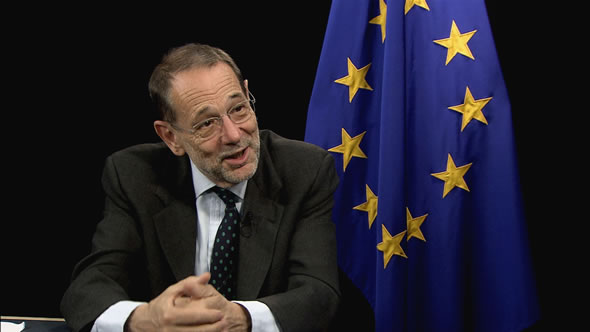A new chance for European politics

By Javier Solana
Javier Solana was EU High Representative for Foreign and Security Policy, Secretary-General of NATO, and Foreign Minister of Spain. He is currently President of the ESADE Center for Global Economy and Geopolitics and Distinguished Fellow at the Brookings Institution.
Most political leaders in Europe want the European Union to
emerge from its current crisis stronger and more united. But the
economic policies that have been implemented in most EU countries
since the crisis began have given rise to an unprecedented threat
to deeper integration - and, indeed, to what already has been
achieved.
After five years of financial and economic crisis, anti-European
politics has come resoundingly to the fore in many EU countries -
France, the United Kingdom, Italy, Austria, Holland, Finland,
Greece, Portugal, and even Germany. Growing institutional
disaffection has become a corrosive reality almost everywhere in
Europe. The only way to overcome Europe's existential crisis, and
to respond to citizens' demands for change, is to confront Europe's
domestic opponents head-on: politics without palliatives.
Europe needs, first and foremost, to break the vicious circle of
recession, unemployment, and austerity that now has it in its grip.
That means, first of all, refocusing economic policy on growth,
employment, and institutional innovation. It is impossible to
advance toward political union while seeming to abandon Europe's
citizens along the way, which is the impression that unremitting
austerity has created. Sacrifice, too many Europeans believe, is
not laying the groundwork for a better, more prosperous Europe, but
is dragging them into a fatal tailspin.
European leaders cannot remain passive in the face of the dangerous
populist tsunami now crossing the continent, and they know it.
There is still time to react - by demonstrating strong leadership
and prioritizing growth over short-sighted policies - but that time
is limited and the clock is ticking.
Next year will be crucial, for it will mark the end of the current
political cycle and the beginning of a new one. There will be a new
German government, European Parliament elections, and, at the end
of the year, a new European Commission. It is here that political
leaders should devote their efforts.
No one wants the EU to fail because of its citizens' disaffection.
To take advantage of the political opportunity offered in 2014
requires launching an open, pedagogical effort now. European
citizens have already shown a sense of responsibility and capacity
for sacrifice, but they should know why hope - in the form of
higher employment and living standards - is not futile.
If that does not happen, next year's European elections may give
rise to an unfortunate paradox. Just when, as a result of the
Lisbon Treaty, the European Parliament gains more power than it has
ever had, the risk of it being condemned to irrelevance is
greatest. If, reflecting the mood in the member states, the
elections result in a fragmented Parliament - possibly rendered
less representative by low voter turnout - paralysis, disaffection,
and ineffectiveness are guaranteed.
That is why Europe's leaders should take advantage of the coming
political cycle to correct Europe's institutional design and
strengthen its democratic legitimacy, thereby enabling them to
respond to Euro-skepticism and ad hoc bilateral deals with more
integration. If Europeans are to overcome their fear of giving up
sovereignty in order to achieve political union, a civic sense of
attachment to Europe and its institutions must be regained and
nurtured.
Achieving this requires, among other things, the recovery of the
Franco-German axis as Europe's driving force. It also presupposes a
European budget that is sufficient to meet expectations and equal
to the challenges that await. Resolving these issues is as
important as resolving individual countries' economic problems.
Indeed, they are in large part the same problem.
Institutions are legitimized in part by their effectiveness, and
the EU must recover its authority to defend common interests and
harmonize them with national concerns. The European Parliament can
exercise its power only if citizens feel represented there. As
Kemal Derviş, a vice president of the Brookings Institution,
recently put it: "If independent technocrats are allowed to
determine long-term policy and set objectives that cannot be
influenced by democratic majorities, democracy itself is in serious
jeopardy."
Next year will also mark the centenary of the outbreak of World War
I. From that moment until the present, Europe has both endured the
worst and enjoyed the best of its history. We should bear in mind
the enormous symbolism of this date in order to understand how much
Europe has changed - and, at the same time, to recognize the need
to defend those changes.
The EU is one of the great political milestones of mankind. For
this reason, and in order to emerge stronger from the difficult
situation in which Europeans now find themselves, Europe's leaders
must work with the conviction that the future is inexorably linked
to a more integrated and more capable Union.
Here we are to serve you with news right now. It does not cost much, but worth your attention.
Choose to support open, independent, quality journalism and subscribe on a monthly basis.
By subscribing to our online newspaper, you can have full digital access to all news, analysis, and much more.
You can also follow AzerNEWS on Twitter @AzerNewsAz or Facebook @AzerNewsNewspaper
Thank you!
